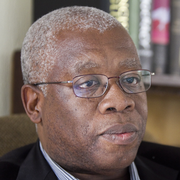
The apartheid government tried to keep apart, on the basis of skin colour, people who have a common future and destiny. While the future was born with the advent of democracy in 1994, our common destiny beckons still, in the distant horizon of freedom, peace and human development.
Every time a lawyer stands up in court to bridge the gap between the truth, justice and the law, the distance to that horizon seems to shorten — only to become a mirage for those to whom the practice of law is much more than the clever turn of phrase that wins the narrow legal point but constitutes a deviation from that which is just, moral and true.
SA is cursed with an abundance of brilliant legal minds that, more often than not, are put to the service of powerful groups and individuals and the lies of social, political and economic justice that have become the mantra of the powerful.
Arthur Chaskalson was one of those lawyers who epitomised the fusion of justice and the law as a moral force in the struggle for a democratic and nonracial society. Chaskalson was not a Cicero who delivered moving and inspiring speeches.
He did not take up arms against the evil system of apartheid, nor did he join a revolutionary movement in pursuit of the idea and reality of justice. Unlike some in our midst, for him, the struggle against apartheid was a struggle for a democratic order in which people must be at the centre of all that is good and noble about our human endeavours.
Mine is not the voice of one who knew Chaskalson personally. I never met him.
Because of my job, I have had the good fortune of meeting great South Africans outside the African National Congress (ANC), a space where, for a long time, I assumed such greatness did not exist. For a long time, I laboured under the illusion that greatness resided exclusively in those who fought against apartheid as members of the ANC.
That I never met Chaskalson has not limited my understanding of what he stood for. I am convinced his work as a Constitutional Court judge, his ideas and what others told me about him speak with more eloquence than the impression I would have gleaned from any personal encounter, for the truth about one who was quiet and humble is embedded in the words of those who knew and loved him.
As South African Communist Party deputy general secretary Jeremy Cronin put it, Chaskalson was authoritative without being authoritarian.
In his public demeanour, therefore, I was not led to the confusion I have about whether every ANC member who fought against white minority rule understands that the struggle against apartheid was a struggle for democracy.
The fact that Chaskalson leaves us in the same year that the ANC is celebrating its centenary and what, to some extent, was not the most glorious of weekends for those who love the ANC, is not insignificant. The ANC centenary year was supposed to be a festival of celebration. This was supposed to be the year in which its members remember that which is good and noble about the liberation struggle. Members of the ANC were supposed to remember their past leaders as those in whom the nobility of the spirit of the oppressed resided and was powerful enough not to be exorcised by the witchcraft of apartheid and colonial rulers. But, more important, it should have been about the realisation that the nobility and resilience of the spirit of the oppressed became a moral force that moved people such as Chaskalson to fight on the side of justice beyond the confines of organisational existence.
When we look into the faces of those like Chaskalson, Jakes Gerwel, Steve Biko, Albertina Sisulu and Robert Sobukwe, who no longer walk among us, how much of that which is good, or ignoble, about us do we see reflected in what we have become? The ANC elective conference in Mangaung this month must be about ensuring that what we see are not the cold death masks of the dearly departed, but those of the bitterly disappointed.
Picture credit: http://www.bdlive.co.za
• Matshiqi is a research fellow at the Helen Suzman Foundation.This article was published on Business Day online.

